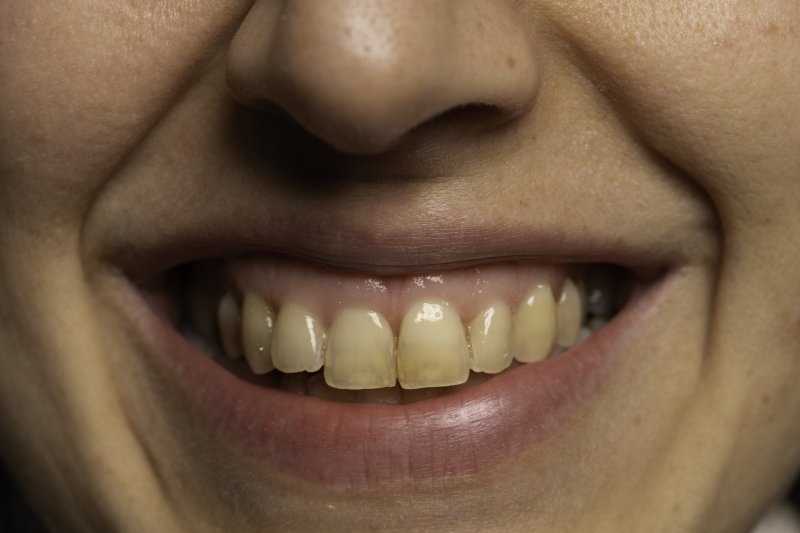
Everyone seems to dream of having a bright, white smile – just like what you see on the big screen. Unfortunately, we aren’t all born with the perfectly bright smile we always wanted. Discoloration can be caused by a wide array of factors, including tobacco use, drinking pigmented beverages, and aging. However, you may be wondering if tooth stains can be genetic as well. Continue reading to learn about how genetics can play a role in the appearance of your smile.
Which Genetics Conditions Can Cause Staining?
There are two different types of genetic conditions that can cause inherited tooth staining or discoloration:
- Dentinogenesis Imperfecta: This inherited genetic condition causes grayish, transparent tooth enamel and weak, brittle teeth. This can affect either primary teeth or permanent teeth.
- Amelogenesis Imperfecta: This is another inherited condition that’s caused by genetic mutations. It causes a yellow-brown tooth discoloration and soft, fragile enamel that’s prone to grooving and pitting. This condition can also increase your risk of tooth decay, chipping, cracking, and breaking.
How Else Can Genetics Affect the Appearance of Teeth?
Even if you aren’t suffering from a genetic condition that causes tooth discoloration, genetics can still affect the color of a person’s teeth. Thick, white enamel runs in families, as does thin, more transparent tooth enamel. If you naturally develop teeth that are more on the yellow side, you may not respond well to store-bought teeth whitening. There are two different types of staining:
- Extrinsic Staining: Extrinsic tooth discoloration is usually caused by foods, drinks, and tobacco use.
- Intrinsic Staining: This type of staining is much more difficult to treat because it’s present below the enamel. This can be caused by certain medical conditions and medications.
How Can Genetic Staining Be Treated?
If you suffer from naturally discolored teeth, the good news is that you have several options. Professional teeth whitening is generally the first thing to consider. Store-bought teeth whitening doesn’t usually provide great results, but whitening from your dentist is much stronger and more effective at lifting stains.
If you have a genetic condition that resulted in weak, discolored teeth, a restoration may be able to help you get the whiter smile that you’re hoping for. This includes the use of dental crowns, dental veneers, and dental implants. By working with your dentist, you can come up with a plan that is best able to help you meet your smile goals.
You don’t have to settle for stained, discolored teeth. Talk to your dentist about your options. This way, you will be showing off a beautifully white smile in no time!
About the Author
Dr. Karen Neil is an experienced dentist who has been working in the field for over three decades. She earned her dental doctorate from the University of Texas Health Science Center at San Antonio and is committed to continuing education to keep her knowledge and skills sharp. Currently, she is a Fellow in the International Academy of Implant Dentistry and the President Elect of the Fort Worth District Dental Society. If you have discolored teeth, she would be happy to help. For more information or to schedule an appointment at her office in Fort Worth, visit her website or call (817) 738-3368.
